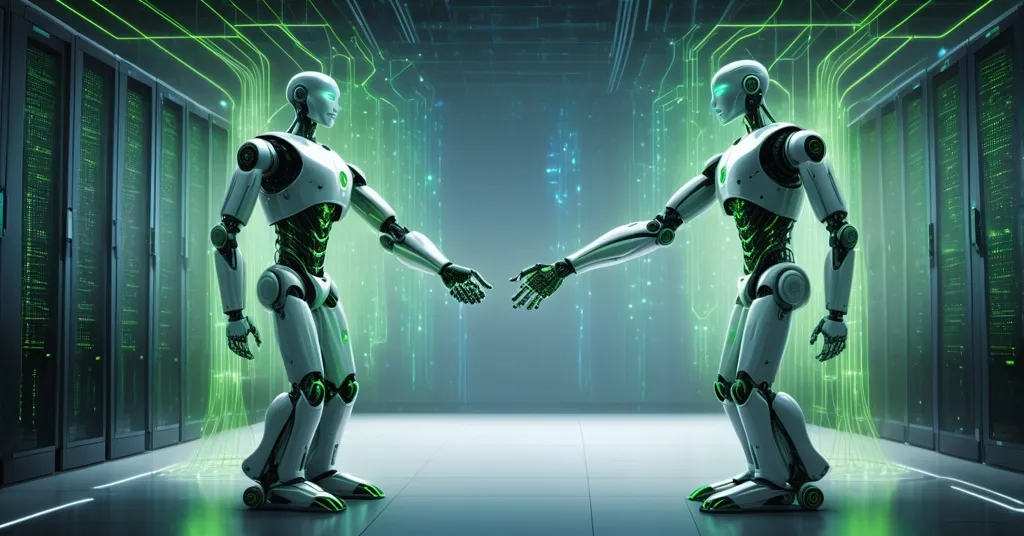Nvidia and OpenAI’s $100B Deal: AI Powerhouse or Hype Machine for Crypto’s Future?

Nvidia and OpenAI’s $100 Billion Deal: AI Titan Alliance or Market Hype Overdrive?
Nvidia and OpenAI have unveiled a staggering $100 billion partnership that’s sending shockwaves through the tech sector. Announced on Monday, this deal ties Nvidia’s industry-leading AI chips to OpenAI’s ambitious data center expansion, coupled with a massive equity investment, raising eyebrows about whether this is a groundbreaking step for artificial intelligence or a calculated publicity stunt.
- Deal Snapshot: Nvidia will supply AI chips, build data centers with 10 gigawatts of capacity, and invest $100 billion in OpenAI equity.
- Market Reaction: Nvidia’s market cap spiked by $180 billion on the news, while OpenAI shores up its $500 billion valuation.
- Big Questions: Is this partnership essential for either company, or just a flashy move to dominate headlines?
The Deal Breakdown: Chips, Data Centers, and a Mountain of Cash
At the heart of this alliance, Nvidia is committing to construct data centers for OpenAI with a minimum capacity of 10 gigawatts—a measure of power so immense it could light up millions of homes. This infrastructure is designed to train and deploy next-generation AI models like GPT-5, the anticipated successor to the tech powering ChatGPT. For those new to the AI game, training these models demands computational muscle on an insane scale, burning through electricity and hardware costs that can hit millions monthly. Nvidia’s H100 GPUs, their top-tier chips built specifically for AI workloads, are the Ferraris of this space—each costing tens of thousands of dollars and in such high demand that supply shortages are a constant headache for tech giants.
Beyond hardware, Nvidia is dropping $100 billion for a slice of OpenAI equity, a sum that dwarfs the $72 billion OpenAI has raised over its 10-year history. To put that in perspective, it’s more than the GDP of many small nations. Nvidia, under CEO Jensen Huang, isn’t exactly strapped for cash—with a $4.5 trillion valuation and roughly $100 billion in yearly free cash flow, they’re a financial juggernaut. So why this colossal bet on a partnership with OpenAI involving data centers and equity? Wall Street certainly ate it up; Nvidia’s market cap surged $180 billion the day the news broke, like investors were tipping a waiter for a five-star meal. Overkill much?
OpenAI’s Gambit: Lifeline or Hype Machine?
For OpenAI, led by CEO Sam Altman, this deal looks like a much-needed shot in the arm. They’re projecting $12 billion in revenue this year, a hefty figure, but their capital expenses are bleeding them dry—think sprawling server farms, skyrocketing energy bills, and relentless R&D to stay ahead. Their $500 billion valuation isn’t just about tech; it’s about maintaining the illusion of unassailable leadership in the race to what Altman calls “superintelligence”—a speculative concept where AI outsmarts humans in virtually every intellectual task, straight out of a sci-fi flick. Partnering with Nvidia screams, “We’re still the top dog,” even as competitors like Google and Anthropic close the gap.
But here’s the rub: OpenAI has been tinkering with its own AI chips to cut reliance on Nvidia’s pricey hardware. So why lock into a $100 billion deal now? Is this a genuine partnership, or are they playing both sides—securing Nvidia’s chips and cash while quietly building an exit strategy? It smells like a hedge, dressed up as a commitment. If their valuation bubble bursts, akin to past tech flops like WeWork, this deal could be less a lifeline and more a shiny distraction.
Nvidia’s Big Bet: Power Play or Risky Overreach?
Nvidia’s angle is even murkier. They’re already the undisputed king of AI hardware, holding a near-monopoly on the chips every tech titan craves. Do they really need to shell out $100 billion to lock in a client? This feels less like necessity and more like a chest-thumping power move—a signal that they’re not just a chipmaker but the backbone of the AI revolution. Still, there’s a gamble here. If OpenAI’s valuation tanks or their chip orders fizzle, that $100 billion equity stake could turn into a financial albatross. Sure, Nvidia’s cash reserves can weather the storm, but it’s a hell of a risk for a company that doesn’t need to prove itself.
Let’s not mince words: this reeks of a bloated publicity stunt, a way to keep Nvidia in the headlines as the indispensable giant. If they’re playing sugar daddy with chips and cash, they’d better hope OpenAI doesn’t turn out to be a prodigal son. Is Nvidia overplaying its hand, or are they just too damn big to fail?
Ripple Effects: Tech Titans and Hardware Wars
The shockwaves of this deal extend far beyond these two players. Nvidia’s other heavyweight clients—Microsoft, Meta, Amazon, and Alphabet—aren’t exactly popping champagne. These companies are neck-deep in their own AI infrastructure races and depend on Nvidia’s chips to keep pace. Any hint of favoritism toward OpenAI could sour these relationships. Nvidia was quick to issue a statement to calm the waters:
“Our investments will not change our focus or impact supply to our other customers. We will continue to make every customer a top priority, with or without any equity stake.”
Translation: “Relax, there’s enough to go around.” But words are cheap. If Microsoft or Amazon sense they’re getting the short end of the stick, expect them to fast-track their own chip development or cozy up to competitors like AMD. This deal might just be the spark that ignites a broader industry push for hardware independence, ironically loosening Nvidia’s iron grip over time. Could this be the beginning of the end for their dominance, or will they just keep steamrolling the competition?
Historical Context: A Pattern of Mega-Moves
This isn’t Nvidia’s first rodeo with high-stakes partnerships, nor is it OpenAI’s first dance with deep-pocketed backers. Nvidia has a history of strategic alliances to cement its market position—think collaborations with cloud providers like AWS to embed their chips everywhere. OpenAI, meanwhile, has pulled in billions over the years, with Microsoft alone pouring in over $10 billion to fuel ChatGPT’s rise. But a $100 billion equity play is a whole new league. It’s reminiscent of tech’s past mega-deals, where hype often outpaced substance—remember AOL-Time Warner’s $165 billion merger in 2000, which cratered spectacularly? While the stakes here are different, the lesson remains: billion-dollar headlines don’t guarantee billion-dollar outcomes.
Regulatory Shadows: Antitrust on the Horizon?
Another angle worth watching is the potential for regulatory scrutiny. A $100 billion tie-up between two titans in a critical industry like AI could raise red flags for antitrust bodies. Governments worldwide are already eyeballing Big Tech for market dominance—look at the Microsoft-Activision merger, which faced intense pushback over competition concerns. Could this deal draw similar heat? If Nvidia’s partnership with OpenAI is perceived as locking out competitors or inflating chip prices through exclusivity, expect lawmakers to start asking tough questions. For now, it’s speculative, but in an era where tech giants are under the microscope, nothing is off the table.
AI Giants and Crypto’s Decentralized Dream: Allies or Rivals?
For our community of Bitcoin enthusiasts and blockchain advocates, this deal hits closer to home than it might seem. AI and decentralized tech are increasingly intertwined, with overlaps in data processing, privacy solutions, and infrastructure challenges. Massive data centers like the ones Nvidia is building for OpenAI—packing a 10-gigawatt punch—mirror the energy debates we’ve long faced with Bitcoin mining. Both industries are slammed for their environmental footprint, yet both could pivot to shared solutions like renewable-powered facilities. Imagine a future where AI training and crypto mining coexist in green data hubs—utopian, maybe, but not impossible.
More critically, there’s the centralization conundrum. Nvidia and OpenAI’s alliance consolidates power in the hands of a few, running counter to the ethos of freedom and disruption we champion in crypto. Yet, decentralized AI platforms—think projects like Fetch.ai or SingularityNET—could leverage blockchain to ensure data privacy and democratize access to AI tools. Could infrastructure built for OpenAI eventually support such initiatives, or will it just entrench corporate control? There’s also potential synergy in optimizing crypto operations; AI algorithms are already used to enhance mining efficiency and predict market trends (though let’s be real, most of that “AI trading” hype is pure snake oil).
Here’s the kicker: resource competition. AI’s monstrous energy and hardware demands could divert focus from crypto’s needs, driving up costs for server space or renewable tech that miners rely on. If AI giants hog the spotlight, will decentralized tech get squeezed out? We’re all about accelerating innovation, but not at the expense of the principles Bitcoin was built on. This partnership doesn’t directly touch BTC or altcoins, but the undercurrents of market manipulation, centralization risks, and tech dominance are battles we fight every day.
Key Takeaways and Burning Questions
- What’s the essence of the Nvidia-OpenAI $100 billion deal?
Nvidia is supplying AI chips, building data centers with 10 gigawatts of capacity, and investing $100 billion in OpenAI equity to support advanced AI models like GPT-5.
- Is this deal more hype than substance?
Quite possibly—Nvidia’s already dominant in AI chips and doesn’t need this to secure clients, while OpenAI’s own chip efforts hint at a hedge; the $180 billion market cap boost for Nvidia suggests it’s a confidence play.
- How does this bolster OpenAI in the AI race?
It secures critical hardware and capital, reinforcing OpenAI’s $500 billion valuation and frontrunner status in chasing speculative goals like superintelligence, keeping rivals at bay.
- What risks does Nvidia face with this move?
If OpenAI’s valuation crashes or chip orders fall through, Nvidia’s $100 billion equity stake could become a costly misstep, though their deep pockets cushion the blow.
- Will this strain Nvidia’s ties with other tech giants?
Potentially—clients like Microsoft and Amazon might feel sidelined, pushing them to accelerate in-house chip development or turn to rivals like AMD, challenging Nvidia’s grip.
- Why should crypto enthusiasts care about this AI deal?
AI’s centralization trends and energy demands echo crypto’s struggles; future competition for resources or synergy in decentralized AI could shape blockchain’s path forward.
This Nvidia-OpenAI partnership is a fascinating, if dubious, chapter in the tech saga. It’s a stark reminder that even in fields poised to redefine the future, the line between genuine progress and headline-grabbing spectacle is razor-thin. As AI giants flex their muscle, will crypto’s decentralized ethos stand as a counterweight—or get trampled in the rush for dominance? We’re keeping a sharp eye on every twist, digging into how these tectonic shifts impact the fight for a freer, more autonomous world.



